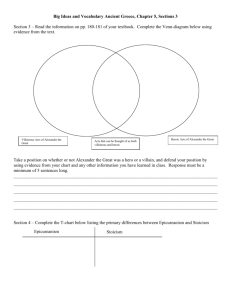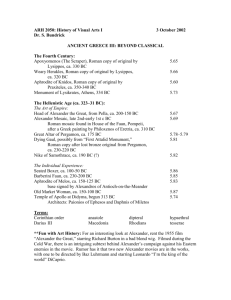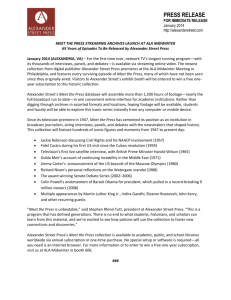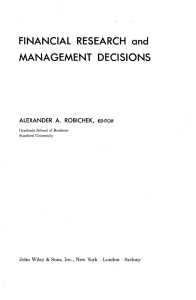UNM Transcripts Web Site Presentation Lecture 9-5
advertisement
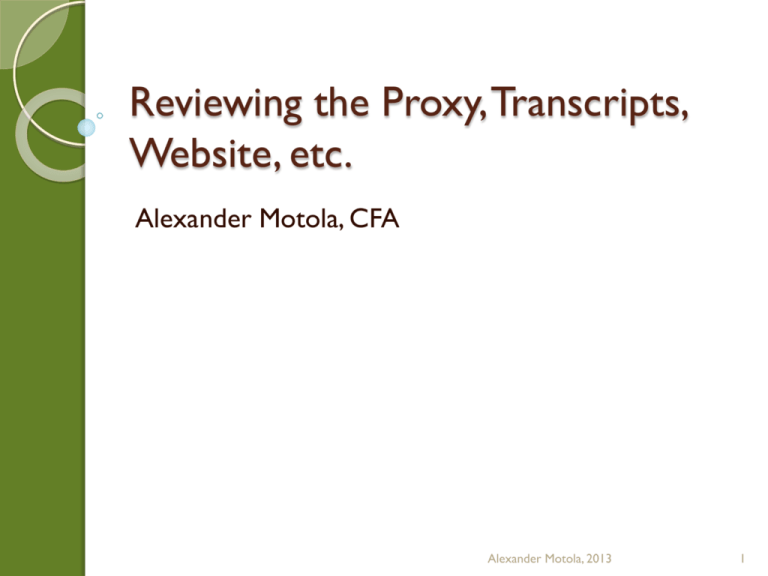
Reviewing the Proxy, Transcripts, Website, etc. Alexander Motola, CFA Alexander Motola, 2013 1 Quality of Earnings, Ch. 3 “Annual Report to Shareholders” The Coleco story The beauty contest – ““It is not a case of choosing those [faces] that, to the best of one’s judgment, are really the prettiest, nor even those that average opinion genuinely thinks the prettiest. We have reached the third degree where we devote our intelligences to anticipating what average opinion expects the average opinion to be. And there are some, I believe, who practice the fourth, fifth and higher degrees.” (Keynes, General Theory of Employment Interest and Money, 1936)” Alexander Motola, 2013 2 Earnings Season Pre-Call ◦ Tighten model, understand consensus, note key metrics that we or others might be focused on Call ◦ Quickly check guidance, #s, stock reaction; then update model from press release, and read everything, then listen Post Call ◦ Send out updated model, commentary, and any change to the recommendation Alexander Motola, 2013 3 Earnings Season Aftermath ◦ Get Q – update numbers, check language ◦ Hold call w/ Management, ask questions, etc. ◦ Follow up with Sell side if necessary Quarterly Earnings are REALLY IMPORTANT because you only really get significant information about your investment ONLY 4 times each year… Alexander Motola, 2013 4 Press Release Headliner is: Alexander Motola, 2013 5 Press Release Data center revenues There is a lot of competition here, are they hurting (is this CTL/Savvis specific, or industry wide)? Is the churn caused by the acquisition? Alexander Motola, 2013 6 Press Release Buy back is good Buying back $2B in stock? You can announce and not execute… Companies also buy back stock to offset dilution from options We can and should audit this ◦ Is the share count actually going down? ◦ What is the company paying? ◦ If part of your recommendation is a big buyback, AND the sharecount is still rising, then that’s bad… on you Alexander Motola, 2013 7 Press Release - Guidance Alexander Motola, 2013 8 Press Release – Pro Forma Alexander Motola, 2013 9 Press Release – Segment Data Pretty good amount of info, 3 categories within one of the four segments, plus margin information, etc. Alexander Motola, 2013 10 Press Release – Pro Forma Alexander Motola, 2013 11 Earnings Call, Webcast, Transcript Usually have the A team on deck Transcripts have a list of participants ◦ Even someone seems to have a great line of questioning, try to get their report Format ◦ Safe harbor ◦ Canned remarks ◦ Q&A Alexander Motola, 2013 12 Transcript They talk more about the buyback “Finally, I'm pleased with the strong progress we made on the share repurchase program we announced in February. Through May 2013, we repurchased 19.2 million shares, or 3% of our outstanding common stock, for a total of $682 million. We repurchased shares aggressively over the past few months, and we expect to opportunistically buy stock going forward. We do expect to complete the $2 billion repurchase by February of 2015.” We can track their progress. We also want to learn if they plan on announcing another buyback once they complete this one. Alexander Motola, 2013 13 Transcript – Q&A First question “David Barden - BofA Merrill Lynch – Analyst - Nice quarter, to start off the year. A couple of questions if I could. First, Stewart, the buyback was very aggressive. You've got about a third of the $2 billion buyback that you've budgeted over the two years behind you now. When you say opportunistic, should we imagine that what you're really going for is a strict $1 billion of buyback this year, a strict $1 billion of buyback next year, or if the opportunity presents itself, how aggressive would you be prepared to be within the context of the full $2 billion buyback authorization?” Answer “Stewart Ewing - CenturyLink, Inc. – CFO - So David, I'll answer the first question, so we were aggressive. By being opportunistic, we will potentially spend more than half of the program in 2013. It really just depends on the stock price, and the opportunity to accumulate more shares at lower prices. So I think we were pretty aggressive. We're not going to continue in all likelihood at the same pace that we did. We still expect to get the program done within the two-year period that we announced, but I would expect us to probably end the year at a little bit higher than $1 billion. Again, just really depending upon opportunity.” So, we can’t assume they are going to get super aggressive Alexander Motola, 2013 14 Transcript – Q&A Other topics raised ◦ Data center weakness (industry has been strong) ◦ Margins on Consumer business ◦ Consumer demand (will be weak) ◦ Follow up on repurchase (would you borrow?) ◦ Debt issuance in March ◦ Cable competition ◦ Network speeds Alexander Motola, 2013 15 Transcript – Q&A – final thoughts Analysts (sell and buy side) always do calls after the earnings call ◦ The tough questions come out then, but you can get a sense from the transcript of who’s soft balling and who’s hard balling ◦ The sell side analysts are “advertising” ◦ Mgmt. picks the order (carefully), and some people are excluded ◦ How mgmt. handles questions says a lot about them Alexander Motola, 2013 16 Investor Presentations Mgmt. or IR presents; most sessions are 20-30 minutes ◦ Usually a breakout session will follow ◦ Conferences are well attended, and popular stocks are usually standing room only Walk through Presentation (notes) Alexander Motola, 2013 17 Proxy Statement Form DEF 14A Voting procedure Conflicts of interest, board member CV Board and executive compensation Audit fees, information, and who is on the audit and comp committees Alexander Motola, 2013 18 How Does the CEO get paid? Proxy Analysis – do bonuses depend on sales growth, ebitda growth, stock price growth, market share? “Reflective of our compensation philosophy, the compensation of our named executive officers is significantly affected by our financial results. As in previous years, the annual non-equity incentive financial performance metric for our named executive officers in 2011 was operating income. Based on the Company’s 2011 operating income of $889 million, which represents a 2.3% increase over operating income in 2010, each of our named executive officers earned slightly above the target payout for annual non-equity incentive awards in 2011. However, in 2011, the long-term equity incentive element of our named executive officers’ compensation was negatively affected by the performance of the Company’s stock price during 2011.” (ALV, 2011 Schedule 14A “Proxy” filing, pgs. 30-31) Alexander Motola, 2013 19 How Does the CEO get paid? What does this mean? ALV goes on to explain the formula: ◦ — Threshold: If the Operating Income is 70% or less of the previous year’s Operating Income, the Company does not pay any annual incentive. ◦ — Maximum: If the Operating Income is 130% or more of the previous year’s Operating Income, the payment equals two times the target amount, the maximum payout under the program. ◦ — Target: Where the relevant Operating Income is between 70% and 130% of the previous year’s Operating Income, the incentive is calculated through linear interpolation (“along a straight line”) between said levels. Incentives matter, so understand what your management is paid to do Alexander Motola, 2013 20


